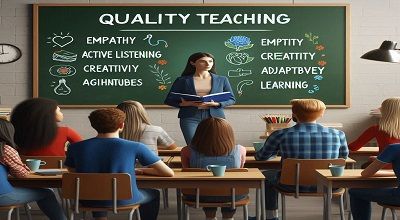Principles of Quality Teaching
The principles of quality teaching can vary to some extent depending on the educational context and philosophy, but several key principles are generally considered essential for effective and impactful teaching. Here are some fundamental principles:
Clear Learning Goals:
- Quality teaching starts with well-defined learning objectives. Teachers should articulate clear goals for what students are expected to learn and achieve.
Relevance:
Connecting the content to real-world applications and students’ lives enhances engagement and helps them understand the practical significance of what they are learning.
Effective Communication:
- Clear and effective communication is crucial. Teachers should articulate ideas in a way that is understandable to students, using appropriate language and supporting materials.
Differentiated Instruction:
- Recognizing and addressing the diverse learning needs of students is essential. Teachers should employ a variety of instructional strategies and adapt their approach to accommodate different learning styles and abilities.
Active Engagement:
- Quality teaching involves keeping students actively engaged in the learning process. This can include hands-on activities, discussions, group work, and other interactive methods.
Assessment for Learning:
- Assessment should be ongoing and formative, providing feedback to both students and teachers about progress and areas for improvement. It should be used to inform instruction and support student learning.
Reflection and Continuous Improvement:
- Teachers should engage in regular reflection on their teaching practices. This reflection should lead to adjustments and improvements in instructional methods and approaches.
Positive Classroom Management:
- Establishing clear expectations and maintaining a positive and well-managed classroom environment is vital for effective teaching. Consistent and fair management contributes to a conducive learning atmosphere.
Technology Integration:
- Integrating technology thoughtfully can enhance teaching and learning. Quality teaching includes the strategic use of technology to support instructional goals and engage students.
Cultural Competence and Inclusivity:
- Recognizing and respecting the diverse cultural backgrounds and perspectives of students is essential. Quality teaching promotes inclusivity and creates an environment where all students feel valued and represented.
Feedback and Feedforward:
- Providing constructive feedback is crucial for student improvement. Teachers should offer feedback that not only identifies areas for improvement but also suggests ways for students to move forward.
Collaboration:
- Quality teaching often involves collaboration, both among teachers and between teachers and students. Collaborative learning experiences can deepen understanding and build a sense of community in the classroom.
Passion and Enthusiasm:
- Teachers who convey enthusiasm and passion for their subject matter can inspire students. A positive attitude toward learning can be contagious and contribute to a more engaging classroom environment.
Final Words
These principles are interconnected and may overlap in practice. Effective teaching often requires a balance of these principles, adapted to the specific needs of students and the learning context.
